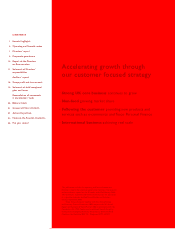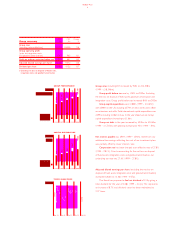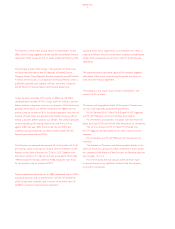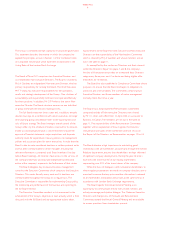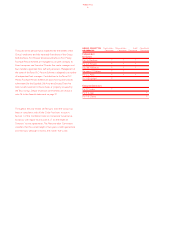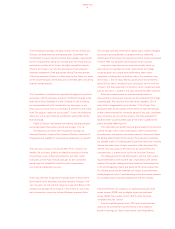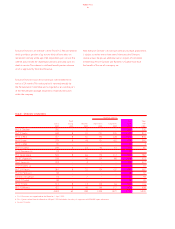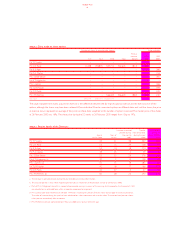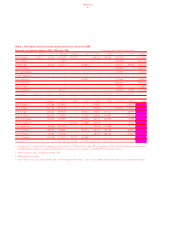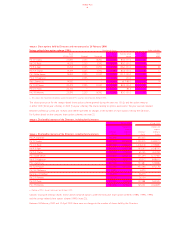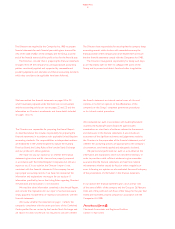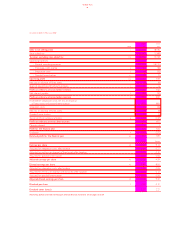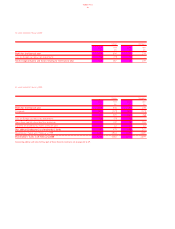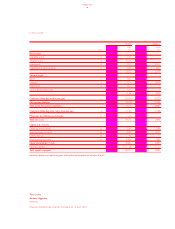Tesco 2000 Annual Report Download - page 12
Download and view the complete annual report
Please find page 12 of the 2000 Tesco annual report below. You can navigate through the pages in the report by either clicking on the pages listed below, or by using the keyword search tool below to find specific information within the annual report.
TESCO PLC
10
Relations with shareholders continued
Each year end, every shareholder may choose to receive a full
Annual Report and Financial Statements or an abbreviated Annual
Review and Summary Financial Statement. At the half year, all
shareholders receive an Interim Report. These reports, together
with publicly made trading statements, are available on the
company’s website (www.tesco.co.uk).
Accountability and audit
The Group has an Audit Committee, chaired by Mr J W Melbourn
and consisting entirely of Non-executive Directors, which meets a
minimum of three times a year. Membership of the Audit Committee
is set out in the table on page 11. Its terms of reference represent
current best practice. The Audit Committee’s primary responsibilities
include monitoring internal control throughout the Group, approving
the Group’s accounting policies and reviewing the interim and
annual financial statements before submission to the Board. In terms
of financial reporting, an assessment of Group performance is set
out in the Operating and Financial Review on pages 2 to 6.
Internal financial control
The Combined Code introduced a requirement upon Directors that
they report on the effectiveness of the whole system of internal
control, including financial and all other controls together with the
risk management process. As permitted by the London Stock
Exchange letter of 27 September 1999, the Board has decided to
adopt the transitional arrangements in respect of principle D.2 of
the Code. As a result, the Board will continue to report on internal
financial control in accordance with the guidance to Directors issued
by the Rutteman Working Group in December 1994. However, the
Directors are of the view that they have established the procedures
necessary to implement the requirements of the Combined Code
relating to internal control as reflected in the September 1999
guidance ‘Internal Control: Guidance for Directors on the
Combined Code’.
The Board has overall responsibility for the systems of internal
financial control. Implementation and maintenance of the internal
financial control system is the responsibility of executive management.
The Board, through the Audit Committee, has reviewed the
effectiveness of the systems of internal financial control for the
accounting year and the period to the date of approval of the
financial statements. It should be understood that such systems are
designed to provide reasonable but not absolute assurance against
material misstatement or loss.
The Group has an established framework of internal financial
controls, the key features of which are as follows:
Organisational structure The responsibilities of the Board set
out above are designed to ensure effective control over strategic,
financial and compliance issues.
Financial framework The Group operates a comprehensive system
of financial reporting to the Board and senior management, based
upon an annual budget and regular forecasts. Weekly and periodic
reports of actual results together with key performance indicators
are produced. The Group monitors financial performance along
with other non-financial objectives through a balanced scorecard
approach ensuring overall alignment of goals and objectives.
Policies and procedures The Group employs 220,000 people
including over 1,500 senior managers. Management control is
formalised at all levels and is regulated by cascading limits of
authority. Formal policies and procedures also exist for areas that
are identified, by their nature, as being significant risk areas. Policies
and procedures are regularly subject to compliance audits.
Quality and integrity of personnel The Group attaches high
importance to the values of trust, honesty and integrity of personnel
in responsible positions and operates a policy of recruiting and
promoting suitably experienced personnel with clearly defined
accountabilities.
Investment appraisal The capital investment programme is subject
to formalised review procedures with key criteria requiring to be
met. All major initiatives require business cases to be prepared,
normally covering a minimum period of five years. Post investment
appraisals are also carried out.
Control monitoring Our external auditors, PricewaterhouseCoopers,
contribute an independent perspective on certain aspects of the
internal financial control system arising from their audit work and
annually report their findings to the Audit Committee. The Group also
maintains an internal audit function whose work is focused on areas
of perceived high risk, as identified by risk analysis, and who regularly
provide reports to the Audit Committee.
corporate governancecontinued


